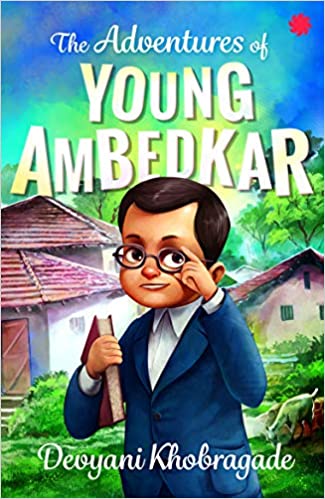Saurabh Tankha
Devyani Khobragade penned The Adventures of Young Ambedkar (Juggernaut; Rs 150) to educate her daughters about the struggles of the Dalit community. A doctor by profession and currently, a joint secretary in the Ministry of External Affairs, Devyani says she stuck to simpler sentences and ensured it didn’t get heavy or somber on the young minds of her daughters. www.lifeandmore.in had a chat with Devyani…
When you narrated the story of Dr Ambedkar to your daughters, what did you keep in mind?
Children too are discerning readers. Very much like adults, I had to keep their curiosity going throughout the storyline first. I have to stick to simpler sentences and shorter sentence structure. I have to keep in mind that it doesn’t get very somber and heavy, even though the book tries to explain very complex sociological facts such as caste, discrimination and social justice to children. I had to take care that it didn’t sound preachy and focus on narration of a young Ambedkar and his experiences.
Apart from Ambedkar, there must be other Indian heroes about whom you would have narrated stories to your daughters. Do we expect more books coming in on the same lines from Devyani Khobragade?
India is a land of a billion people and a billion stories. However, some inspirational stories are told less often than the others. It is these stories that I wanted to bring to my daughters. As they grow up, I wish them to have local roots and global shoots. I want the countless young lives to be aware of the awe inspiring history, instil pride in Dalit and non-Dalit children alike of the tenacity of the struggle of Dr Ambedkar and the Dalit community, to see their country as the birthplace of one of the biggest social justice movements in the world. I enjoyed writing and given a chance, I would like to bring the sub-altern heroes, especially women on whom there is hardly any children’s literature available. For example, books on women like Rani Chennama or Durgaavti, Savitribai Phule and Pandita Ramabai would be great to write.
You are a doctor, an IFS officer and now, a storyteller and an author. Which of these roles do you enjoy the most and why?
While I was trained as a doctor, and am a proud IFS officer representing my country, I was, and will always remain a storyteller. We humans connect with each other through stories and are deeply influenced by them. The process of becoming a doctor taught me many things — value of hard work, appreciation of health and life. I take pride in representing my country abroad. My job and my writing are both equally satisfying in different ways. Of course, writing is a more relaxed and unstructured activity where I can take creative liberties and express myself much more freely. At the same time, I can contribute to bringing marginalised voices into mainstream and popular discourse.
When you were your daughters’ age, who narrated stories to you?
I distinctly remember my paternal grandmother and father narrating stories to me and my sister. This was an integral part of their visits from the village. Another memory etched in my mind is the Amar Chitra Katha children’s book on Dr Ambedkar that my father bought me when I was in second grade. I still remember the pictures of that book — of a young Ambedkar sitting on a mat in the corner of a classroom. I am grateful to my parents, that despite having little money, they bought books to instill pride in our history and struggles. I know through personal experience what an impact history has on a child’s mind, on her perception of society and social awareness.
Do you feel the books today have become so expensive that they have gone out of reach of the common man and has resulted in the reading habit going down to some extent?
Those of us who can read in English can mostly afford books, even though the generation Z, who were born with the internet and web in their blood may prefer to read digitally. The challenge is to use the governmental systems, public libraries and E libraries in rural areas to reach books to the masses.
Any author who inspired you to write?
Prem Chand and Anton Chekhov. They both bring ordinary people’s lives to the foreground and are so honest and ruthless about our hypocrisy and fallacies.
In your opinion, what is that one thing which is the most important part of a book?
That the book is sincere and honest.
The word “creative” to you is…
There is nothing like originally creative. We all learn from each other’s stories and get inspired to create our own.
What does it take to be good storyteller?
I feel that a good writer has a literary style that’s not manipulative of the reader.
Fiction or non-fiction…
Fiction is certainly more creative and readable but I don’t get much time for it now.
Favourite childhood book…
Ginger Bread-man. I still remember the illustrations..
Favourite childhood author…
RK Laxman
Favourite book now…
At present, I’m trying to re-read some old books with my daughters and seeing them through their eyes, like Oscar Wilde, Great Gatsby, 1984, Roal Dahl. I wish to now get them interested in Indian authors.
Favourite author now
Dr BR Ambedkar and my husband, Aakash Singh Rathore. Am reading his book on Dalit feminist theory.
